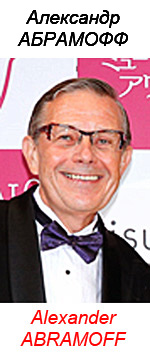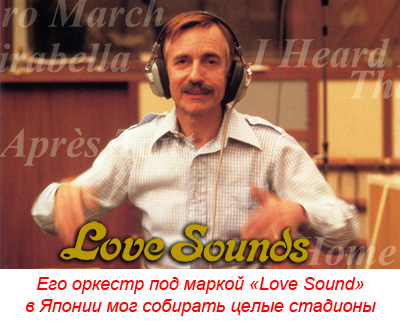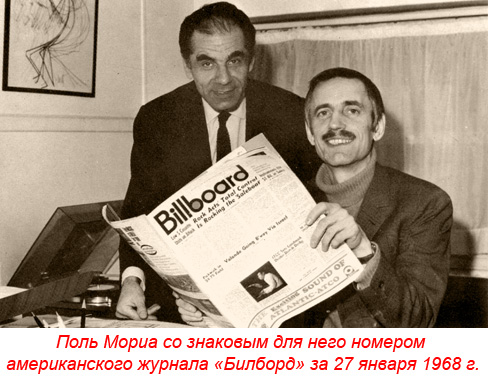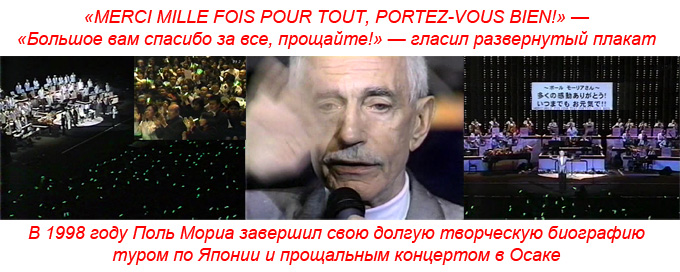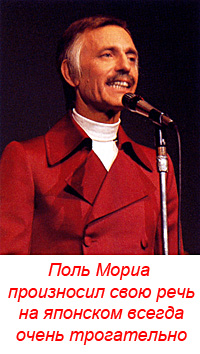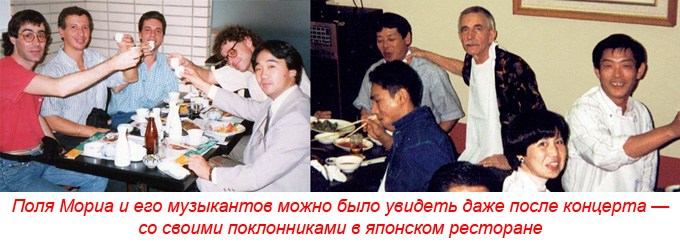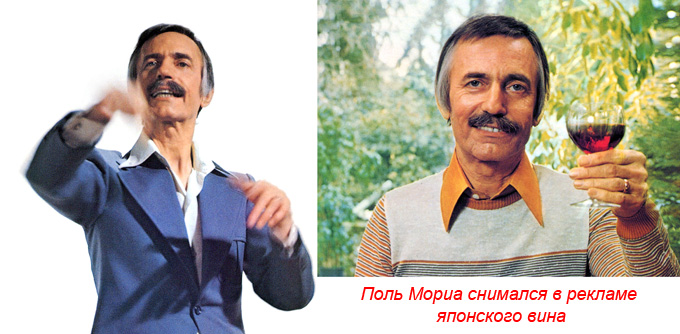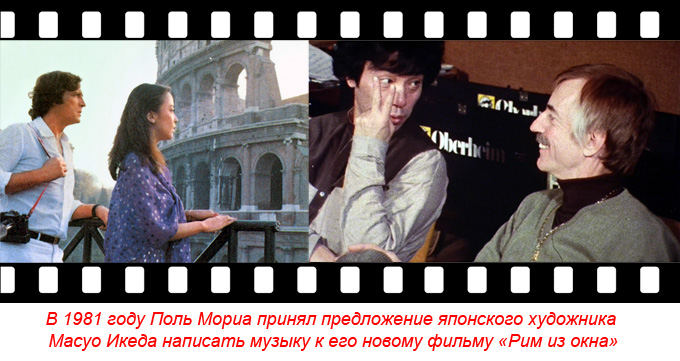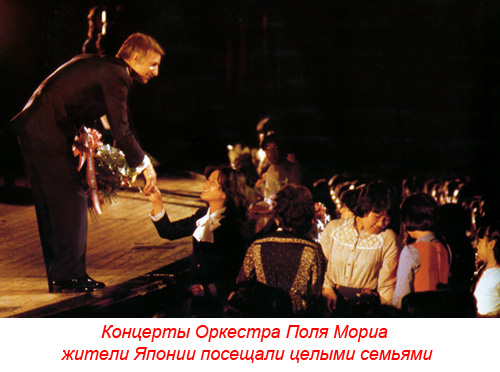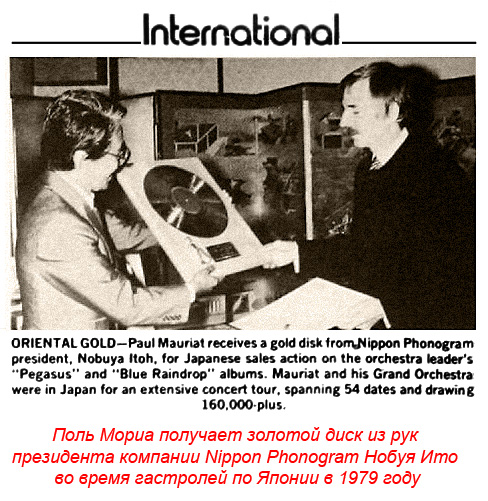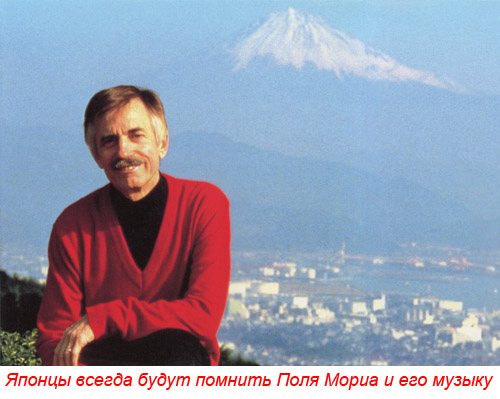МУЗЫКА ПОЛЯ МОРИА ВСЕГДА БУДЕТ С ЛЮДЬМИ В ЯПОНИИ

Французский мастер легкой музыки Поль Мориа не был суперзвездой во Франции, в отличие от таких исполнителей как Шарль Азнавур, Мирей Матье или Сальваторе Адамо. Но лишь ему удалось стать № 1 из всех французских артистов в США! А его многочисленные записи, особенно «Love is blue», продолжают быть одними из самых ярких и притягательных продуктов всего французского экспорта.
Paul Mauriat, the French master of «easy listening», was not a superstar in France unlike the top-singers such as Charles Aznavour, Mireille Mathieu or Salvatore Adamo. But he managed to become No.1 of all French artists in the United States! And his numerous recordings, especially «Love is blue», are continuing to be the one of the brightest and most attractive goods of whole French export.
10 лет назад друзья маэстро во всем мире почувствовали себя сиротами. Своими воспоминаниями о Поле Мориа любезно поделился президент японской компании звукозаписи Nippon Phonogram / Mercury Music Entertainment в 1990-1999 Александр АБРАМОФФ.
10 years ago the Maestro’s friends in the world felt orphaned. Own memories about Paul Mauriat kindly shared the president of the Japanese record company Nippon Phonogram / Mercury Music Entertainment in 1990-1999 Alexander ABRAMOFF.
— Уважаемый Александр! Вы помните как началась популярность Поля Мориа в Японии?
— Dear Alexander! Do you remember how started Paul Mauriat’s popularity in Japan?
— В 1977 году, когда я присоединился к Nippon Phonogram — компании звукозаписи Поля Мориа в Японии, он был уже знаменит в стране. Так что, я не был свидетелем того, как начиналась его популярность в Японии. Музыка, исполняемая Оркестром Поля Мориа, в Японии помечалась как «Love Sound», поэтому, слыша всякий раз фразу «love sound», она автоматически ассоциировалась с Полем и его музыкой.
— I joined Nippon Phonogram, Paul Mauriat’s record company in Japan, in 1977 and at that time he was already a big name in the country. Thus, I was not there to witness how his popularity in Japan was kicked off. The music played by the Paul Mauriat Orchestra was tagged «Love Sound» in Japan and whenever one heard the phrase «love sound», it was automatically associated with Paul and his music.
— Насколько велика была японская аудитория его оркестра в 70-х?
— How large was the Japanese audience of his orchestra in 70s?
— Каждый раз, когда Оркестр Поля Мориа приезжал на гастроли, он делал около 30 концертов по всей Японии, что было хорошим показателем. Каждая площадка могла вместить как минимум около 2,000 зрителей.
— A good indication is that the Paul Mauriat Orchestra was doing around 30 sold out concerts throughout Japan each time the orchestra toured the country. Each venue could seat at least around 2,000 people.
— Какие записи Поля Мориа ваши любимые?
— What recordings by Paul Mauriat are your favorite?
— Их очень много, но если бы меня попросили назвать несколько, я бы сказал «Love is Blue» и «El Bimbo».
— There are so many, but if I were asked to name a few, I would say «Love is Blue» and «El Bimbo».
— Как вы могли бы объяснить феномен Поля Мориа в Японии?
— How you could explain the phenomenon of Paul Mauriat in Japan?
— Ничто лучше не может описать его феномен как один факт: Поль Мориа является единственным международным артистом, сыгравшим два аншлаговых концерта в один день в Токио на знаменитой 10,000-й арене «Ниппон Будокан». Кроме того, я мог довольно свободно ходить с Полем по Елисейским полям в Париже, но я едва ли мог ходить с ним по улицам Токио, так как поклонники его узнавали и моментально окружали со всех сторон.
— Paul Mauriat is the only international artist to this date who played two sold-out shows in one day at the famous Nippon Budokan, a 10,000 seater in Tokyo — nothing else better describes the phenomenon. Also, although I could walk on Champs Elysees in Paris rather freely with Paul, I could hardly walk with him on streets in Tokyo as he was surrounded by fans the moment he was recognized.
— Наверняка вы также внесли вклад в его популяризацию как журналист «Билборда»?
— Surely, you have also contributed to its popularization as a journalist in «Billboard» magazine, is it not?
— Как автор журнала «Билборд» я не сделал никакого реального «вклада» в его популярность, зато помогал распространять новости о его популярности в Японии по всему свету, включая Бразилию, которая для него являлась вторым по величине рынком после Японии.
— I did not really «contribute» to his popularity as a writer for Billboard, but I certainly helped to spread the news of his popularity in Japan around the world including Brazil which was his second largest market after Japan.
— Вы помните ваш первый контакт с Полем?
— Do you remember your first contact with Paul?
— Мой первый контакт с Полем состоялся в начале 70-х, когда я брал у него интервью для японской деловой газеты «Музыкальная лаборатория» — дочернего издания журнала «Билборд» в Японии. Тогда я делал интервью на французском, который до этого изучал восемь лет в средней школе и университете. Он был очень любезен, отвечая на все мои вопросы, и я до сих пор помню, каким вдумчивым он был о Японии и своих поклонниках в стране. Было ясно, что он не против тратить свое время и прикладывать усилия на рынке.
— My first contact with Paul was in early 70’s when I interviewed him for a Japanese music trade paper called «Music Labo» which was the sister publication of Billboard in Japan. At that time, I did the interview in French which by that time I had studied for eight years at high school and university. He was very kind in answering all my questions and I still remember how thoughtful he was about Japan and his fans in the country. It was clear that he did not mind to spend his time and efforts on the market.
Затем я стал работать в Nippon Phonogram в 1977 году, и мы часто говорили о нашей первой встрече, но говорили по-английски, поскольку мой французский ослабел. Последний раз я практиковал язык с Полем на его прощальном вечере, который компания Nippon Phonogram или Mercury Music Entertainment, как ее называли тогда, устроила для Поля в Осаке после его последнего концерта в Японии. Полю нравилась моя французская речь.
After I joined Nippon Phonogram in 1977, we often talked about our first encounter but spoke in English as my French was weakening. The last time I practiced my French with Paul was at his farewell party which Nippon Phonogram, or Mercury Music Entertainment as it was call then, hosted for Paul in Osaka after his last concert in Japan. Paul liked my speech in French.
— Расскажите о вашей работе с ним в то время.
— Please, tell about your work with him at that time.
— Было всегда приятно работать с Полем, но я должен упомянуть замечательного менеджера, который был рядом с ним — покойного Валентина Купо. Валентин был джентльменом в полном смысле этого слова. Он находился за микшерным пультом на всех концертах Поля, работая на звуке. Валентин делал легкими и приятными отношения с Полем для всех нас — то есть людей из компании звукозаписи, концертных промоутеров, прессы и т.д. Без Валентина, я уверен, Поль не смог бы пользоваться той популярностью, какой он пользовался в Японии.
— It was always a pleasure to work with Paul, but I must mention the wonderful manager he had beside him — late Valentin Coupeau. Valentin was the gentleman in every meaning of the word. He was at a mixing console at all of Paul’s concerts working on the sound. Valentin made it easy and pleasant to deal with Paul for all of us — i.e. people at a record company, concert promoters, press, etc. Without Valentin, I am sure Paul could not enjoy the popularity he enjoyed in Japan.
— Каким человеком и артистом вы вспоминаете Поля?
— What a person and an artist you recollect Paul?
— Поль любил Японию и своих поклонников в стране. Для каждой поездки по стране он готовил пятиминутную речь на японском языке, которую тщательно запоминал и произносил в начале каждого концерта на протяжении всего тура. Это, конечно, трогало людей в Японии. Кроме того, каждый раз, когда оркестр гастролировал по Японии, они играли японские хиты, которые тогда были популярны. Шлягеры были аранжированы в фирменном стиле Поля «love sound» и во время исполнения на концерте становились приятным сюрпризом для его аудитории.
— Paul loved Japan and his fans in the country. For every tour of the country, he prepared a five minute speech in Japanese which he memorized thoroughly and gave at the beginning of each of his concert throughout the tour. This of course moved hearts of people in Japan. Also, every time the orchestra toured Japan, they played Japanese hits which were popular in the country then. The hits were arranged in Paul’s style of «love sound» and, when they were performed at a concert, they were a pleasant surprise for its audience.
Поль заботился не только о своих поклонниках в Японии, он также прекрасно заботился о членах своего оркестра. После концерта он брал нескольких музыкантов на ужин, который часто проводился в японском ресторане. Он делал все, чтобы ни один музыкант не пропустил такой ужин и был на нем как минимум один раз во время тура. Такая забота трогала членов его оркестра.
Paul not only cared about his fans in Japan, but he also took excellent care of members of his orchestra. After a concert, he took a small number of members of his orchestra out for dinner which was often held at a Japanese restaurant. He made it sure that every member was taken out for such dinner at least once during a tour. Such thoughtfulness moved hearts of members of his orchestra.
— Ему нравилось что-нибудь в Японии?
— Did he liked anything in Japan?
— Поль был большим поклонником японского вина «Koshu». На самом деле он сделал телевизионный рекламный ролик для «Mercian Wine» в Японии. Он также был большим поклонником мраморного мяса «Kobe Beef», которое, вероятно, является лучшей говядиной в мире. Он с удовольствием посещал рестораны «Teppanyaki» в Японии. Я также помню, что он был большим поклонником японских часов, «Seiko» был его любимый бренд.
— Paul was a big fan of Japanese «Koshu» wine. He actually did a tv commercial for «Mercian Wine» in Japan. He was also a big fan of «Kobe Beef» which probably is the best beef in the world. He enjoyed going to «teppanyaki» restaurants in Japan. I also remember that he was a big fan of Japanese watches — «Seiko» was his favorite brand.
— Получал ли Поль предложения от японских коллег к сотрудничеству?
— Did Paul received a lot of offers from Japanese colleagues to cooperate?
— Да, Поль сотрудничал со многими японскими артистами. На мой взгляд, наиболее заслуживающим внимания является музыка кино, которую он создал к фильму Масуо Икэда «Roma dalla finestra» (Рим из окна). Это была единственная работа Поля в японском кино.
— Yes, Paul did collaborate with many Japanese artists. The most noteworthy, I believe, is the film music he did for a Japanese film called «Madokara Romaga Mieru» (Roma dalla finestra) which was conducted by Masuo Ikeda. This was the single time that Paul did music for Japanese movie.
— Какое влияние он оказал на японскую эстраду?
— What influence he have had on the J-pop?
— Возможно, он не имел никакого прямого влияния на японскую эстраду, но Поль изменил концертную сцену в Японии. Вплоть до него японцы, заканчивая университет и поступая на работу в компанию и надевая галстук, переставали посещать концерты. Однако, концерты Поля привлекали пожилых людей и семьи. Они даже нарисовали три поколения: бабушки и дедушки, родители и дети.
— He may not have had any direct impact on J-Pop, but Paul did change the concert scene in Japan. Up until his time, people in Japan once they graduated from their university and joined a company and put on a necktie, they stopped going to concerts. However, Paul’s concerts drew older people and families. They even drew three generations — grandparents, parents and children.
— По информации американского журнала «Билборд» Поль Мориа получил золотой диск в 1972 за альбом «Penelope» и еще один диск в 1979 за «Pegase» и «Mizuiro no ame». Как много он быть удостоен наград за другие успешные записи, например, «El Bimbo»?
— According to American «Billboard» magazine Paul Mauriat was awarded by the one gold disc in 1972 for the album «Penelope» and another gold disc in 1979 for the «Pegase» and «Mizuiro no ame». How much he awarded prizes for other successful recordings, such as «El bimbo»?
— Я не помню сколько золотых наград Поль получил в Японии. Однако, помню, что на Nippon Phonogram мы продали более 20 миллионов альбомов Оркестра Поля Мориа на протяжении долгих лет в Японии.
— I do not remember how many gold albums Paul received in Japan. However, I do remember that at Nippon Phonogram we sold more than 20 million albums of the Paul Mauriat Orchestra over the years in Japan.
— За какое количество проданных дисков присуждался золотой диск?
— For how much number of sold albums the artist was awarded a gold disc in Japan?
— В настоящее время в Японии существует единый стандарт золотых альбомов, но во времена активности Поля каждая японская рекорд-компания имела свой собственный стандарт для награждения золотым диском своих артистов. На Nippon Phonogram мы обычно награждали золотом, когда продажи конкретного альбома превышали 100,000 экземпляров.
— Although there is an industry-wide standard for gold albums now in Japan, during the years when Paul was active in Japan, each record company had its own standard to award a gold album to its artists. At Nippon Phonogram, we used to award a gold album when sales of a particular album exceeded 100,000 units.
— Как вы думаете, Поля Мориа всегда будет жив в сердцах людей?
— On your opinion, will Paul Mauriat always be alive in the people’s hearts in Japan?
— Определенно думаю, что это так. Музыка Поля до сих пор слышна по телевидению, радио, в магазинах и других местах в Японии и его музыка всегда будет с людьми в Японии.
— I definitely think so. Paul’s music is still heard on tv, radio, in-stores and other places in Japan and his music will always be with people in Japan.
Большое спасибо за ваши ответы!
Thank you very much for your answers!

